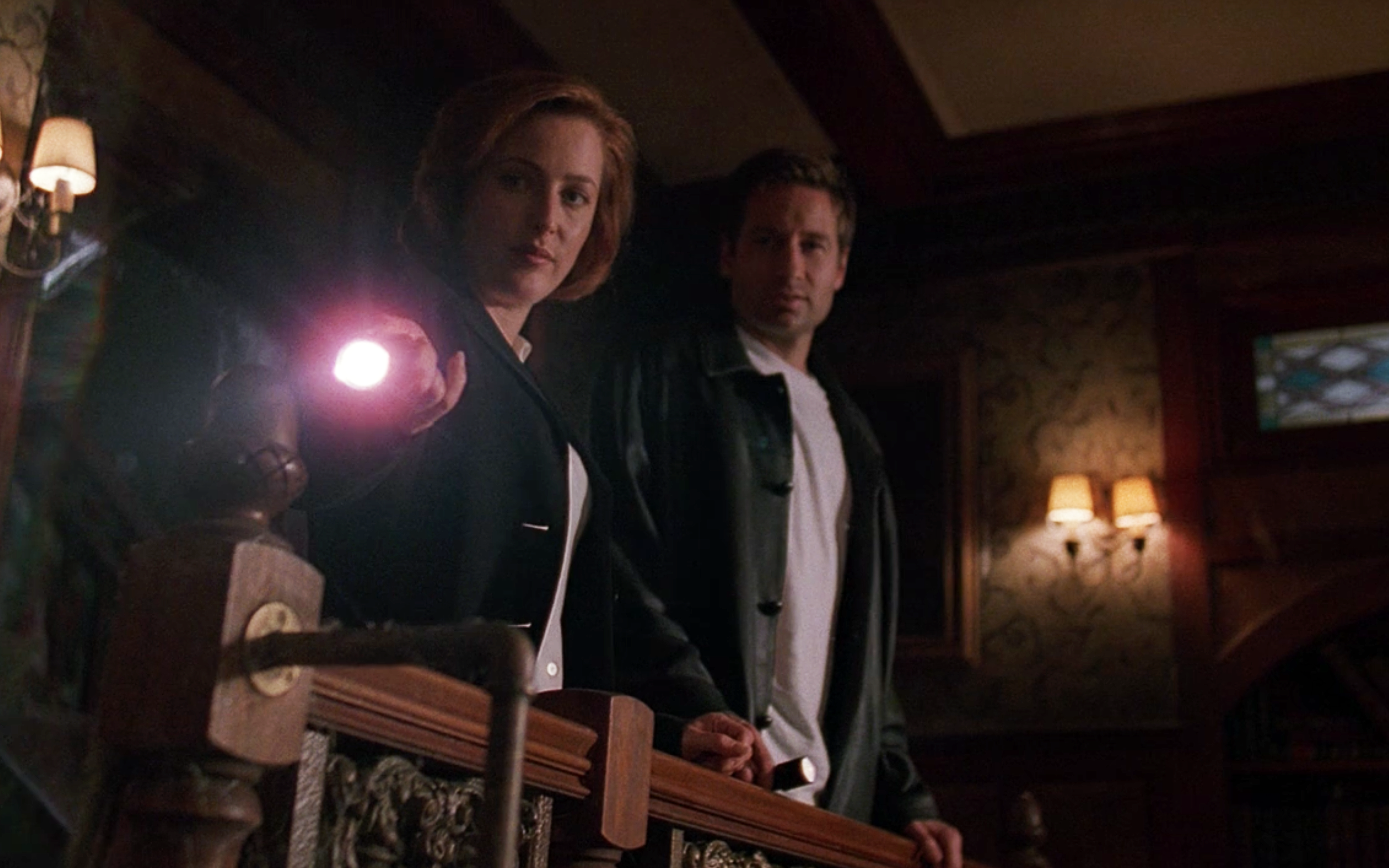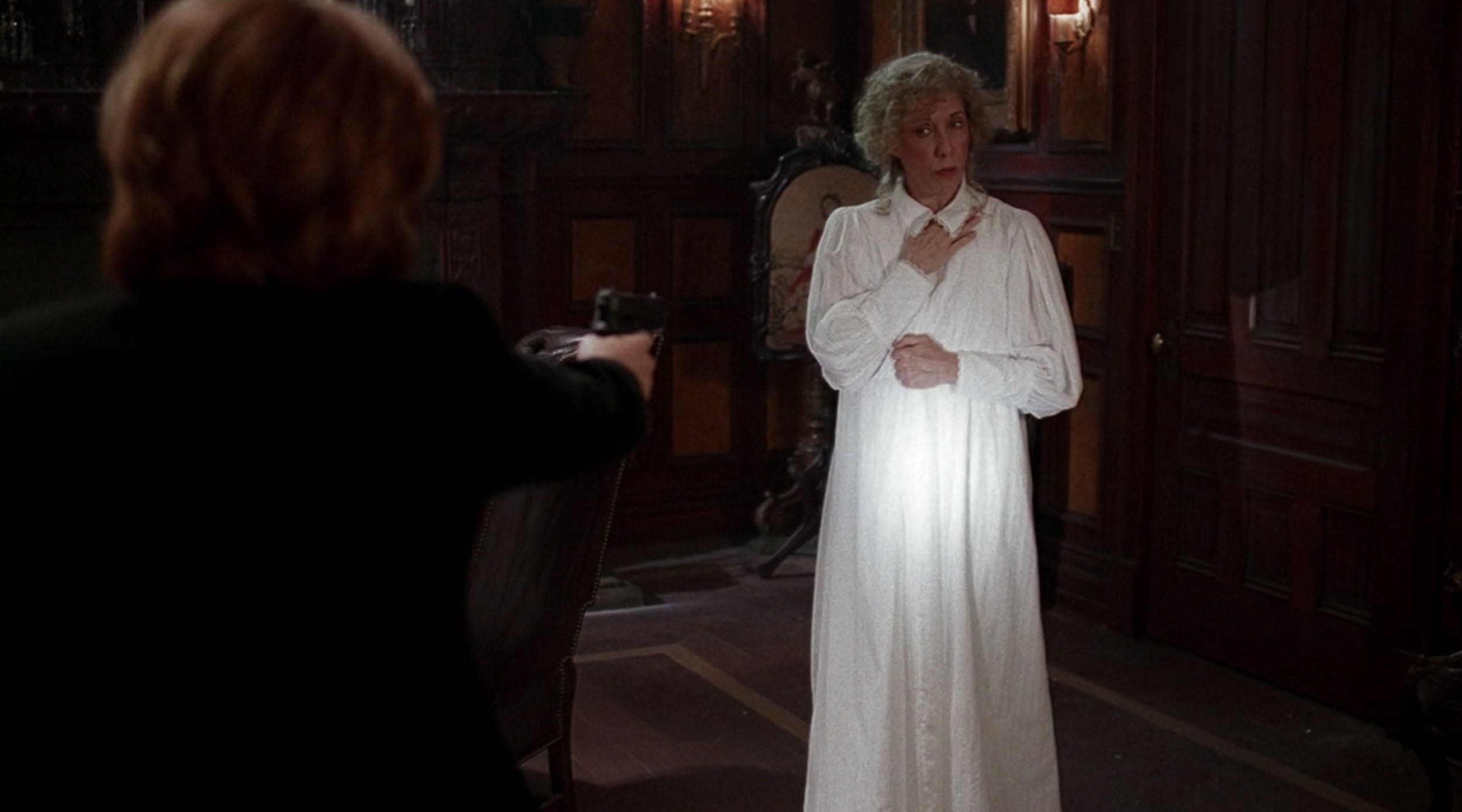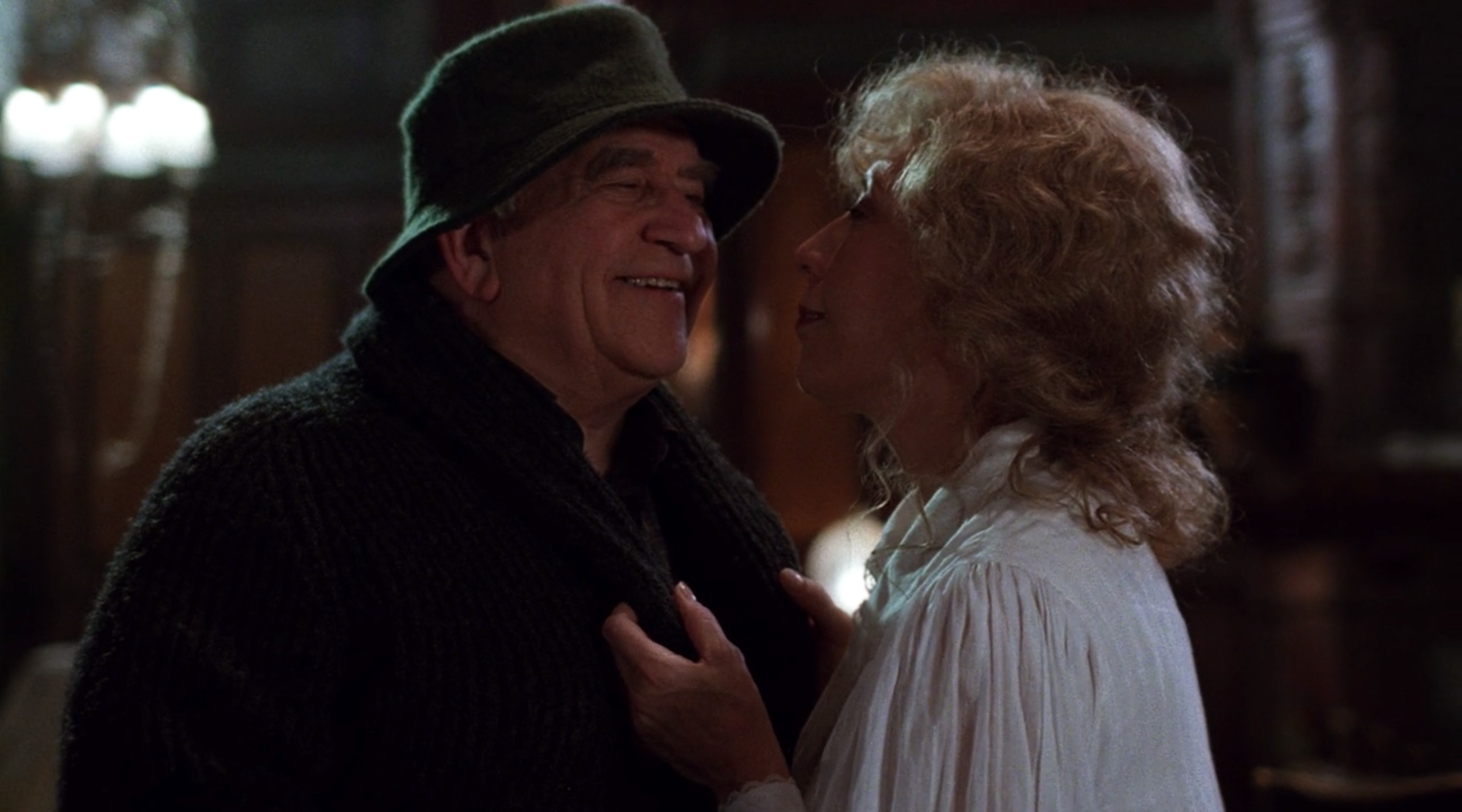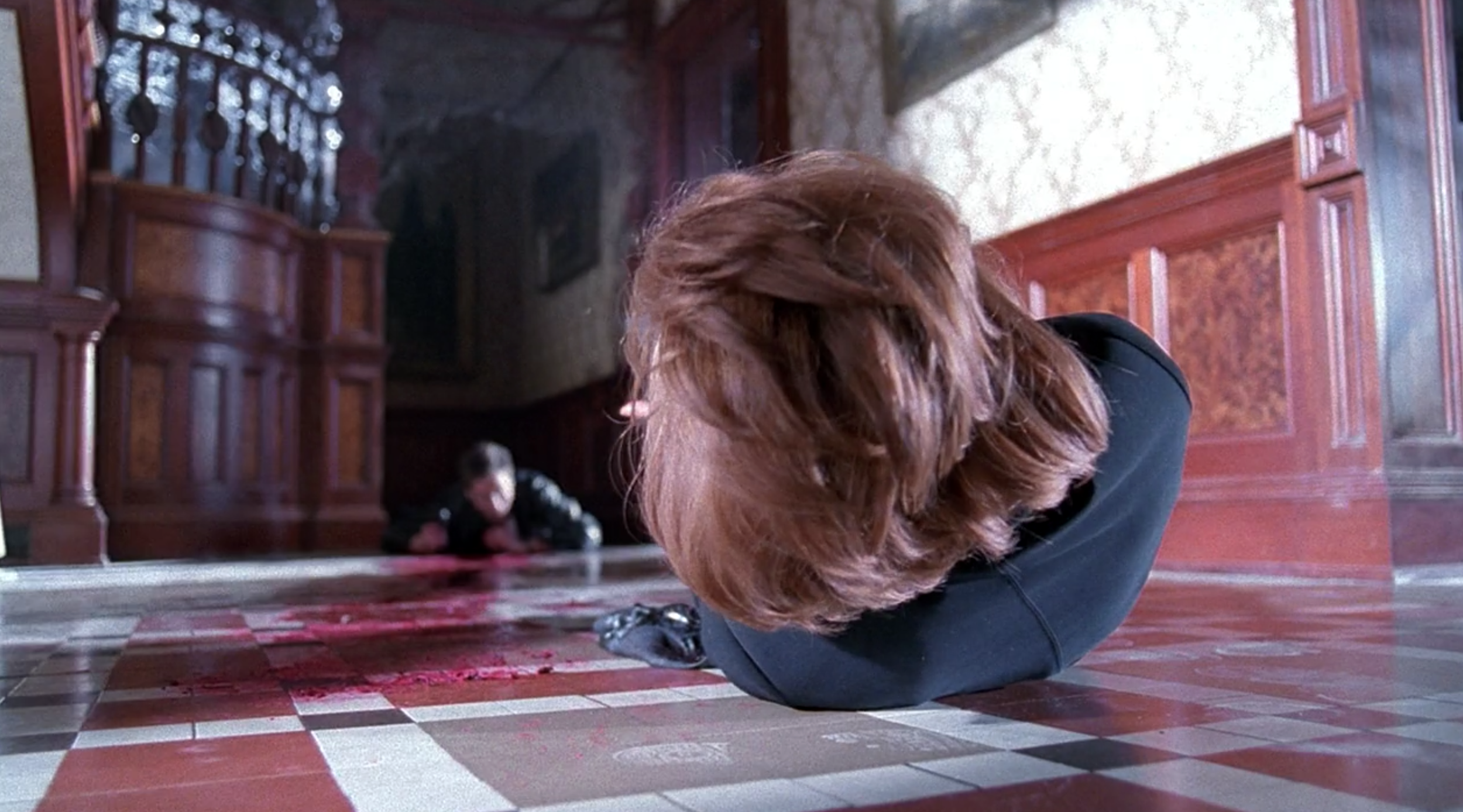[Editorial] 12 Ghouls of Christmas: The X-Files’ “How the Ghosts Stole Christmas”
Gather ‘round the fire. I will tell you a ghost story. It is, after all, the season for ghosts.
It was Christmas, 1917—a time of dark, dark despair. The First World War and a deadly flu virus ravaged the world; populations were decimated with previously unimaginable speed. Loathe to be apart, the lovers Maurice and Lyda at the Gothic manor on Larkspur Lane formed a pact, a mutual suicide so they may be together in death forever. Ever since, they say their ghosts haunt the manor. And what’s more, it’s cursed: Couples who enter its threshold are doomed to double murders, all on Christmas Eve.
Pretty dark for Christmas, right? Well, not really. Before Charles Dickens’s A Christmas Carol revived the holiday, celebrations in Great Britain had receded nationally, especially in industrialized cities. Thanks to the novella’s success, its appeal to goodwill and generosity is part and parcel of our December festivities. But one essential component of the story has been buried under the plastic Santa Clauses and garish animatronics: ghosts. True to Gothic form, Victorian Christmas was incomplete without ghosts. Many a volume of Christmas ghost stories that readers can now collect testifies to their popularity. Somewhere along the way, however, we’ve traded in our ghosts for reindeers and singing snowmen. But they still haunt the season. After all, in It’s the Most Wonderful Time of the Year, a song everyone with a radio knows by heart, Andy Williams croons about “scary ghost stories and tales of the glories of Christmases long, long ago.” If there’s any piece of pop culture that’s willing to recapture the ghoulish heart of Christmas, it’s The X-Files.
How the Ghost Stole Christmas has a simple premise: Agent Mulder (David Duchovny), having told his partner Scully (Gillian Anderson) the aforementioned ghost story, lures his partner into the manor in hopes of spotting a ghost. Delectably Gothic, the sixth season episode nails the atmosphere: a thunderstorm, a cobwebbed library, a clock keeping perfect time in an abandoned manor anda recently extinguished fireplace with no one to warm. Have Yourself a Merry Little Christmas slips in, overriding the organ music that opens the episode. We know we’re in for a good, old fashioned Christmas haunt.
Mulder, the believer, and Scully, the skeptic, characteristically investigate the manor, the former giddy and the latter long-suffering. It’s Christmas Eve and Scully has places to be, presents to wrap and unwrap. Mulder, on the other hand, reserves his eves for ghostbusting. The holiday is almost incidental to the episode. In fact, faith is largely absent from the narrative: other than Lyda’s comment, “We’re Jewish,” when Scully demands where there Christmas tree is—and, indeed, both ghosts are played by Jewish actors—there’s little indication of Christmas as a Christain celebration, a notable decision in light of the show’s emphasis on Scully’s Catholicism and Mulder’s intimated secular Judaism. Rather, Christmas’s psychological significance dominates. Christmas is shorthand for the depressive season—the time of the year when suicide rates increase, seasonal affective disorder sets in, and we have long dark winter hours to ruminate on our failures. Christmas, the episode suggests, is a time for everyone to despair, regardless of faith.
The ghosts stress this sentiment. Played hilariously by the superb Ed Asner and Lily Tomlin, the very corporeal ghosts of Maurice and Lyda divide and conquer. After a few scares, including the discovery of corpses eerily similar to themselves under the floorboards, Mulder and Scully are separated. In one room, Maurice encounters Mulder, Lyda finds Scully in another . Instead of jump scares or Beeltlejuice-esque hauntings, the ghosts take a pop psychology approach to capitalize on the agents’ self-doubts. “These two do seem pretty miserable. We need to show them just how lonely Christmas can be,” Maurice says to Lyda, who responds, “Now that’s the old yuletide spirit.”
With five seasons and a movie prior to How the Ghosts Stole Christmas, The X-Files’s audience knows Mulder and Scully pretty well at this point. So when Maurice sits Mulder down, insisting he’s a specialist in the field of mental health, his diagnosis of Mulder is both poignant and funny. “Are you overcome by the impulse to make everyone believe you?” he asks, asserting Mulder is a “narcissistic, overzealous, self-righteous egomaniac . . . You kindly think of yourself as single-minded, but you’re prone to obsessive compulsiveness, workaholism, antisocialism. Fertile fields for the descent into total wacko breakdown.” He concludes that Mulder believes he’s seen aliens, cryptids, and conspiratorial men in black because he’s lonely; they give his life meaning. This analysis isn’t enough—Maurice twists the knife by dragging Scully into it: “You know why you do it—listen endlessly to her droning rationalizations. ‘Cause you’re afraid. Afraid of the loneliness.”
At the same time, in another room, Lyda accuses Scully of living “an awful small life.” “Spending your Christmas Eve with him,” she continues, “running around chasing things you don’t even believe in” in order to prove Mulder wrong, her “only joy in life.”
With the agents’ hackles raised by their own flaws and their partner’s, the ghosts conjure up their master stroke: a guiding hand towards double murder. Their deaths, Maurice and Lyda posit, is a way to never spend Christmas alone again. It’s tempting. Culminating in a piece of trickery in which Mulder and Scully believe themselves to be shot by the other, they nearly fulfill the manor’s curse. Have Yourself a Merry Little Christmas kicks in again, this time with delightful irony as Mulder and Scully aim their guns at each other, blood staining the floor. They narrowly escape. Realizing their gun wounds are an illusion, they flee the manor and hastily drive their separate ways.
While not an adaptation of A Christmas Carol, not even in the roundabout manner of It’s a Wonderful Life, How the Ghosts Stole Christmas is nevertheless aware of the influence. Ghosts aside, when Mulder watches Scrooge laugh on the little television in his apartment at the end of the episode, his loneliness—like Scrooge’s early in the story—resonates. And like in A Christmas Carol, our Scrooges learn their lesson. The episode wraps up as a knock sounds on Mulder’s door. It’s Scully. Concluding what happened was all in their heads, Scully hesitatingly comments that she assumed she’d prove him wrong about the ghosts; Mulder likewise concedes it was narcissistic to assume Scully wanted to come along on his stakeout. Pondering their flaws, they flounder for a moment. But then Scully rebuts the ghosts’ diagnoses, saying, “Maybe I did want to be out there with you.”
This is the point of the episode. Of The X-Files, really. The sixth season teeters on a precipice fans long anticipated: After a near kiss in Fight the Future, the film set between seasons five and six, the latter season is the first to tread on romantic grounds. The ghosts seem to be aware of this. Before their escape, Lyda muses on the psychological significance of their illusions: “The bodies under the floor—maybe that was just some kind of Jungian symbolism. Or maybe there’s a secret lovers’ pact.” Mulder informs her they’re not lovers. Lyda replies, “And this isn’t a pure science.” Similarly, Lyda tells Scully, “I can see it in your face—the fear, the conflicted yearnings, a subconscious desire to find fulfillment through another. Intimacy through codependency.” What’s important about The X-Files isn’t precisely the nature of Mulder and Scully’s relationship, which is always at its most successful when held in suspension; rather, it’s their steadfastness, enforced by their complimentary (and contrasting) perspectives. Though much of it is unspoken, Mulder and Scully’s relationship is a partnership in every sense of the word.
How the Ghosts Stole Christmas is a tongue-in-cheek treatise on seasonal loneliness. It declares that the worst things we tell ourselves during the holiday season are tricks of the mind—ghosts. And they can eat us alive, if we let them. As Maurice and Lyda reflect on their own failure to enact their curse, they laze before the fire. “People now . . . this is just another joyless day of the year,” says Maurice. But not for them: “We haven’t forgotten the meaning of Christmas.” They fade, hand-in-hand, and we return to the agents. When Have Yourself a Merry Little Christmas plays for the final time over Mulder and Scully’s impromptu gift exchange, the camera floats away from the little apartment, which suddenly seems warm and cozy. From now on, their troubles will be out of sight—or, at least, until the next government conspiracy arises.
Ghosts have always been part of Christmas. As Scully explains, “the longing for immortality, the hope that there is something beyond this mortal coil—that we might never be long without our loved ones.” These desires, she says, are “the very essence of what makes us human. The very essence of Christmas, actually.” The X-Files embraces the season’s darkness and its yearnings for companionship. Mulder and Scully’s loneliness isn’t invented, but it’s also not the overriding principle of their lives. No matter the conflict, the faithful friends have one another. Though How the Ghosts Stole Christmas at first figures despair as the reason for the season, it ultimately settles on the cheerful Christmas that Dickens had in mind, with just the right pinch of melancholy. Sometimes ghosts just need to show us the way.






![[Editorial] Soho Horror Film Festival: Interview with Aimee Kuge on Cannibal Mukbang](https://images.squarespace-cdn.com/content/v1/5fe76a518d20536a3fbd7246/1701808004722-9M8SZ2UXY52QBQBR4NTI/img20230818_15150780.JPG)
![[Editorial] 9 Horror Nintendo Switch Games To Play](https://images.squarespace-cdn.com/content/v1/5fe76a518d20536a3fbd7246/1697214470057-3XZXX8N4LYIMDFWS6Z3P/Screenshot+2023-10-13+at+17.20.13.png)
![[Mother of Fears] Mothering in Silence in A Quiet Place (2018)](https://images.squarespace-cdn.com/content/v1/5fe76a518d20536a3fbd7246/1696445921315-HZJ2DZYQIH6VVWXBO2YL/Screenshot+2023-10-04+at+19.52.29.png)
![[Event Review] Highlights from Mayhem Film Festival 2023](https://images.squarespace-cdn.com/content/v1/5fe76a518d20536a3fbd7246/1697624582491-MPT2VB9RRGU6OG7L6UKL/Mayhem+2023.jpg)
![[Editorial] Mayhem Festival: Interview with Thomas Sainsbury on Loop Track (2023)](https://images.squarespace-cdn.com/content/v1/5fe76a518d20536a3fbd7246/1697186472899-WC4RR0TW7L7LMFEBGPA2/Tom+Sainsbury.jpg)
![[Editorial] Keeping Odd Hours: A Retrospective on Near Dark (1987)](https://images.squarespace-cdn.com/content/v1/5fe76a518d20536a3fbd7246/1696445070868-HU9YIL3QPBCL1GW47R3Z/Screenshot+2023-10-04+at+19.36.53.png)
![[Editorial] 5 Female Focused Horror Book Recommendations](https://images.squarespace-cdn.com/content/v1/5fe76a518d20536a3fbd7246/1696441981361-52EQCTJ7AT2QF1927GM7/919xtm6d3fL._AC_UF894%2C1000_QL80_.jpg)
![[Editorial] What to Watch at This Year's Cine-Excess International Film Festival 2023](https://images.squarespace-cdn.com/content/v1/5fe76a518d20536a3fbd7246/1697213510960-REV43FEOZITBD2W8ZPEE/Screenshot+2023-10-13+at+17.01.15.png)
![[Editorial] Cherish Your Life: Comfort in the SAW Franchise Throughout and Beyond the COVID-19 Pandemic](https://images.squarespace-cdn.com/content/v1/5fe76a518d20536a3fbd7246/1695487675334-MYPCPYYZQZDCT548N8DI/Sc6XRxgSqnMEq54CwqjBD5.jpg)
![[Editorial] The Art of Horror in Metal](https://images.squarespace-cdn.com/content/v1/5fe76a518d20536a3fbd7246/1695486401299-E5H2JNNJT26HKN0CI7WC/Screenshot+2023-09-23+at+17.20.28.png)














![[Editorial] 10 Films & Events to Catch at Soho Horror Film Fest 2023](https://images.squarespace-cdn.com/content/v1/5fe76a518d20536a3fbd7246/1700819417135-299R7L4P0B676AD3RO1X/Screenshot+2023-11-24+at+09.41.52.png)
![[Editorial] 9 Best Slashers Released Within 10 Years of Scream (1996)](https://images.squarespace-cdn.com/content/v1/5fe76a518d20536a3fbd7246/1695478839037-LOFHGVM3H6BMSZW7G83M/Screenshot+2023-09-23+at+15.15.11.png)
![[Mother of Fears] Mother Vs. Monster in Silent Hill (2006)](https://images.squarespace-cdn.com/content/v1/5fe76a518d20536a3fbd7246/1695485781119-H6GNP0G3J2TLPAOIABV7/Screenshot+2023-09-23+at+17.11.56.png)
![[Editorial] 9 Terrifying Cerebral Visions in Horror Movies](https://images.squarespace-cdn.com/content/v1/5fe76a518d20536a3fbd7246/1693509801235-X23OL50T1DVGECH0ZJK2/MV5BMjQ0MTg2MjQ4MV5BMl5BanBnXkFtZTgwMTU3NDgxMTI%40._V1_.jpg)
![[Mother of Fears] I Don’t Wanna Be Buried in a Pet Sematary (1989) and (2019)](https://images.squarespace-cdn.com/content/v1/5fe76a518d20536a3fbd7246/1691328766069-QFNAVJOMFZVZ5CLU1RWM/Screenshot+2023-08-06+at+14.23.13.png)

Now it’s time for Soho’s main 2023 event, which is presented over two weekends: a live film festival at the Whirled Cinema in Brixton, London, and an online festival a week later. Both have very rich and varied programmes (with no overlap this year), with something for every horror fan.